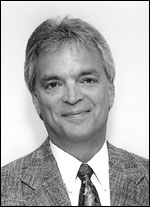
Am Fam Physician. 2000;62(9):1943
Last week the staff of AFP and the AAFP learned of the death of one of our long-time colleagues, R. Michael “Tubie” Miller, J.D., the Academy's deputy executive vice president. Mr. Miller, 57, died of a heart attack while outdoors on an unseasonably cold October Sunday in Kansas City, ending a 32-year-long career with the AAFP just months before a planned early retirement and sending Academy staff into disbelief and sadness over the loss of an old friend.
Although most AFP editorial staff didn't have the opportunity to work directly with Mr. Miller from day to day, we met with him occasionally to exchange information with him and Dr. Robert Graham, AAFP's recently exiting executive vice president. In fact, we had intended to meet again with Mr. Miller on the day we learned of his death and found ourselves wondering instead how such a vital piece of our organization could so suddenly vanish. Dr. Henley, current executive vice president, gathered a stunned and somber AAFP staff together on that Monday morning as we began to comprehend our loss and assimilate memories.
Mr. Miller, described by past chair Dr. Lanny Copeland as “gruff and sometimes grumbling,” nonetheless had a “heart of gold that easily shone through the façade.” It was easy to see the light shining from the heart of gold during our meetings with Mr. Miller, as he thoughtfully responded to our queries about policy or other matters, always going the extra mile to explain or understand a perspective. It was the heart of gold that lit up our chance meetings with him in the hallways, and it was the heart of gold that comforted us during his years at the Academy as he earned himself legendary status in organizational history. How did Mr. Miller become an AAFP legend?
With a rich and colorful personality juxtaposed against calm, rational dedication to the organization, its members and its staff, Mr. Miller earned the highest recognition from the Academy—Honorary Membership—just two years ago at the Congress of Delegates in San Francisco. Past president Neil Brooks, M.D., said then, “He has served as a utility player in the Academy, as general counsel, acting executive vice president and now deputy executive vice president. He has added to the lore, the laughter, the legend of the Academy. He has inspired and will continue to inspire leadership in the Academy.” Indeed, Mr. Miller was recently described as the “conscience of the organization” by Clayton Hasser, vice president of publications and communications, and as the organization's “ethical, reliable North Star” by Dr. Graham.
A native Kansan, Mr. Miller entered school at the University of Kansas, Lawrence, after graduating as valedictorian at Pratt High School in 1961. He earned a bachelor's degree in political science in 1965 and achieved a law degree three years later. He joined the AAFP staff on October 1, 1968, devoting his entire professional career to the organization. In 1969, he became director of the Department of Legislation. In 1972, he became general counsel for the AAFP, and two years later he took on the additional role of director of the socioeconomics division. He became vice president of legislation and socioeconomics in 1980. He served as acting executive vice president from 1984 to 1985, and received two honors afterward—the President's Award and the Award of Merit. He was named as the AAFP's first deputy executive vice president in 1992.
Mr. Miller was a life member of the University of Kansas Alumni Association and a yearly contributor to the KU Endowment Association's Williams Educational Fund. Memorial contributions can be sent to The Mike “Tubie” Miller Scholarship Fund, c/o The Williams Educational Fund, University of Kansas, 210 Wagnon, Lawrence, KS 66045.
